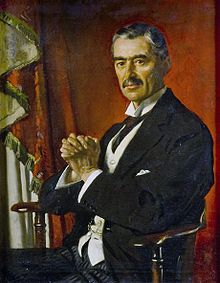
In the final season of Downton Abbey, we and the characters are living through the year 1925.
The government was trying to make the hospital system in the country more rational and efficient, and to that end of Minister of Health tours around listening to ideas of experts and prominent non-experts alike. He comes to Downton Abbey in this capacity and we witness a dinner in his honor.
The name of the health minister is Neville Chamberlain. To some extent, I think, the writers have taken a historical liberty here. Chamberlain was the Minister of Health at one point in the 1920s, but I believe by 1925 he had moved upward, becoming Chancellor of the Exchequer. Anyway, since his name became famous/notorious as a result of events late in his life/career, so if its a bit of fictional fudging, it's an understandable bit.
At the dinner, two hospital-affiliated professionals with very different views on public health issues begin to argue in front of him. Chamberlain says, "I thought I was coming here to listen to a unified presentation, not to witness a battle royale."
The dowager of the estate says, "Don't you enjoy a good fight, minister?"
Chamberlain, "No, I don't think I do."
The moment moves on quickly. But I do think the writers had a bit of a subtle laugh there.
And, no, there was no umbrella in sight.
Comments
Post a Comment